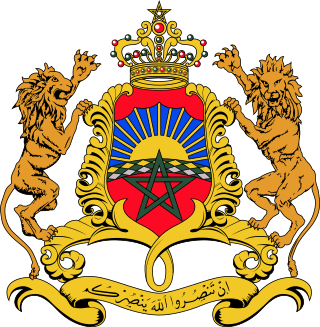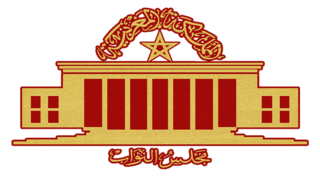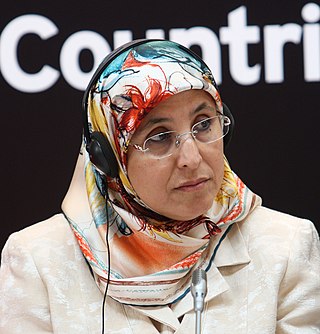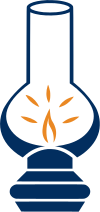
Politics of Morocco take place in a framework of an official parliamentary semi-constitutional monarchy, whereby the prime minister of Morocco is the head of government, and of a multi-party system. Executive power is exercised by the government. Legislative power is vested in both the government and the two chambers of parliament, the Assembly of Representatives of Morocco and the Assembly of Councillors. The Moroccan Constitution provides for a monarchy with a Parliament and an independent judiciary.

The National Rally of Independents, is a political party in Morocco. Despite self-identifying as social-democratic, the party has been described as pro-business and liberal, and the party has a history of cooperating with two other parties with a liberal orientation, the Popular Movement and the Constitutional Union, since 1993. Since September 2021, it has been the country's ruling party.

The Parliament of Morocco is the bicameral legislature of Morocco. It is located in Rabat.

The House of Representatives is one of the two chambers—the other of which is the House of Councillors—of the Moroccan Parliament. The House of Representatives has 395 members elected for five-year terms, 305 of whom are elected in multi-seat constituencies, and 90 of whom are elected in two national lists dedicated to promote gender equality and national youth.

Saadeddine Othmani, sometimes translated as Saad Eddine el-Othmani, is a Moroccan politician. He served as the 16th prime minister of Morocco from 17 March 2017 to 7 October 2021. Previously he served as foreign minister from 2012 to 2013.
Mohammed V University is a public university in Rabat, Morocco. It was founded in 1957 under a royal decree (Dahir). It is the first modern university in Morocco after the University of al-Qarawiyyin in Fez. It is named after Mohammed V of Morocco.
The Party of Renaissance and Virtue is a political party in Morocco. It defines itself as moderate Islamist. However, Siham Ali of Magharebia describes it as an Islamist party.

The Authenticity and Modernity Party is a political party in Morocco. It was founded in 2008 by Fouad Ali El Himma, an advisor to the king Mohammed VI, and it has been perceived by its opponents and the press as being backed and directed by the monarchy. As such, it has been accused of having little ideology except for support of the monarchy, although some of its policies have been described as socially liberal.

The Moroccan protests are a series of demonstrations across Morocco which occurred from 20 February 2011 to the fall of 2012. They were part of the larger Arab Spring protests. The protests were organized by the 20 February Movement.

Early general elections were held in Morocco on 25 November 2011, brought forward from 2012 and then postponed from 7 October 2011.

Aziz Akhannouch is a Moroccan politician, businessman, and billionaire who is serving as the 17th Prime Minister of Morocco since his government took office on 7 October 2021. He is the CEO of Akwa Group and also served as Minister of Agriculture from 2007 to 2021.

Abdelilah Benkirane is a Moroccan politician who was the 15th Prime Minister of Morocco from November 2011 to March 2017. After having won a plurality of seats in the 2011 parliamentary election, his party, the moderate Islamist Justice and Development Party formed a coalition with three parties that had been part of previous governments.
Abdellah Baha was a Moroccan politician of the Justice and Development Party and member of the Executive Office of the Uniqueness and Reform Movement (MUR). From 3 January 2012 until his death, he served as Minister of State in Abdelilah Benkirane's government.

Bassima Hakkaoui is a Moroccan politician of the Justice and Development Party. Between 3 January 2012 until 9 October 2019, she has held the position of Minister of Solidarity, Women, Family and Social Development in Abdelilah Benkirane's cabinet. She has been a member of the House of Representatives since 2002, having been elected from the national list reserved for women. She was re-elected in 2007 and 2011. In 2018 a law went into effect throughout Morocco known as the Hakkaoui law because she drafted it; the law includes a ban on forced marriage and sexual harassment in public places, and harsher penalties for certain forms of violence. But it was criticized for requiring victims to file for criminal prosecution to get protection.

The prime minister of Morocco, officially head of government, is the head of government of the Kingdom of Morocco. The prime minister is chosen by the king of Morocco from the largest party elected to parliament. The Constitution of Morocco grants executive powers to the government and allows the head of government to propose and dismiss cabinet members, provincial governors, and ambassadors, to oversee government programs and the delivery of public services, and to dissolve the lower house of parliament with the king's approval.

General elections were held in Morocco on 7 October 2016. The ruling Justice and Development Party remained the largest party, winning 125 of the 395 seats in the House of Representatives, a gain of 18 seats compared to the 2011 elections.

Nasser Bourita is a Moroccan diplomat serving as the Minister of Foreign Affairs, African Cooperation and Moroccan Expatriates since 5 April 2017.

Sheikh Dr. Ahmed Raïssouni is a Moroccan Islamic scholar and jurist. He served as president of the International Union of Muslim Scholars (IUMS) until his retirement in 2022. He was the former head of the Movement of Unity and Reform (MUR), an organization closely linked to the Muslim Brotherhood and the Moroccan Justice and Development Party.
Abdelaziz El Omari is a Moroccan politician from Errachidia, Morocco. He served as the mayor of Casablanca, Morocco and the president of the Casablanca City Council.

General elections were held in Morocco on 8 September 2021 to elect 395 members of the House of Representatives. The National Rally of Independents led by Aziz Akhannouch won the most seats (102), a gain of 65 seats from the prior election. The liberal Authenticity and Modernity Party took second place with 87 seats, a net loss of 15 seats. The centre-right Istiqlal Party gained 35 seats and took third place with 81 seats total. The governing Justice and Development Party suffered an electoral wipeout and won only 13 seats, a net loss of 112 seats for the party.















